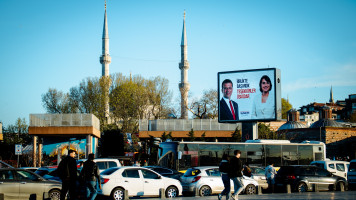
To film or not to film: Cinema in conflict zones conceals the true horrors of war

Jackie Chan’s latest production, Home Operation hit headlines for the wrong reasons.
After filming scenes in the Syrian town Al Hajar Al Aswad, which was bombed by Assad’s regime, the joint Chinese-Emirati project is being called out for “whitewashing” the brutal regime’s crimes and the psychological harm viewing such a film will cause Syrian citizens.
This isn’t the first time a Chinese project has come under fire for its insensitive approach to human rights violations.
"The issue of cinema capitalising upon areas of violence occurs throughout the world"
The much-awaited live-action version of Mulan was boycotted by fans and activists after the end credits thanked Xinjiang’s provincial government – 55a province where there are known to be internment camps detaining Uyghur Muslims.
But while the global power dynamics have made it so that Chinese human rights abuses are highlighted in Western media, the issue of cinema capitalising upon areas of violence occurs across the world – and it’s time its impact is understood.
While the ethics of filming in former war zones or areas of violence are questionable, other aspects seem to take priority for filmmakers. Sabina Giado, a filmmaker and aspiring novelist who makes films on Muslim women points out how filmmakers can often view these locations as an added convenience.
“With films on the scale we’re talking about [Home Operation & Mulan] there’s heaps of money involved and it’s about convenience. Having the Xinjiang government on board is an added convenience because it pushes obstacles out of your way,” she says while adding, “Generally, the physical safety of the crew and the emotional and psychological and cultural safety is not a concern for film producers, staying on budget and schedule is.”
|
Failure to acknowledge the area they’re filming in or the impact it can have on viewers can lead to the subconscious condoning of the crimes of that area.
Tracy Rosenberg, executive director of Media Alliance says that most US citizens actually probably don’t know enough about Xinjiang to understand the significance of Mulan being filmed there. “In terms of US audiences I don't think anyone knows where Mulan was shot, perhaps they should but they don't,” she says adding, “It isn't always visible or present to audiences where this film was shot.”
The erasure of marginalised peoples by ventures that capitalise on them and make money off of the conflict they are enduring is one of the main reasons why these efforts at outsourcing shoot locations to such regions are being called out.
But even when the location is made clear, money and power dynamics often mean that the narratives put forth are done in favour of those in charge of the funding.
Adil Akhoon, a journalist in Srinagar, Kashmir and the founder of Mountain Ink Magazine points out that skewed narratives around the Kashmir conflict have been a source of trauma that has lasted generations.
“You ask any Muslim in Kashmir and they’ll tell you they’ve lost at least one loved one in the conflict. So when movies like The Kashmir Files portray those same Muslims to be perpetrators of violence, it’s very traumatic. And to tell them you’re the reason the situation is bad is victim blaming ” he says.
Adil also points out how Bollywood has been capitalising on the conflict in Kashmir, most recently when the abrogation of Article 370 – which led to an international outcry – saw at least 50 titles being registered on the topic. “The movies have not even been made but the titles are registered because they know this will sell,” he says.
"Everything everywhere is a story so we have to ask who is gaining from sharing this story and who is losing. Who has shaped this story? Who has the power"
The narratives that movies such as the ones Adil talks about sell aren’t limited to Kashmir or any other region, and Tracy points out that it comes from how filmmakers by default are in the business of selling fantasies.
“Filmmakers are in the business of selling fantasy, I wouldn’t be surprised if some films are made to wipe away their government's culpability in crimes,” she says when talking about how associating a Disney princess with Xinjiang will clearly have an impact on the government and that area is viewed.
|
Even when certain incidents and locations in films fly under the radar, the impact they have on content and viewers can leave a lasting mark.
Sabina says she only found out after watching season 4 of the popular Netflix show Stranger Things that some parts were filmed in the area of an old concentration camp.
“I was struck by how many scenes of torture there were and how the narrative was constantly sticking to trauma. So when I found out about the concentration camp I felt the trauma of the place affected the narrative. All these things uphold the status quo, who has the power to shape the narrative and who do we get to ignore.”
This is why activists are pushing to get filmmakers to take more responsibility for their content and make sure that they’re uplifting narratives in marginalised regions as opposed to capitalising on them for their own benefit.
Tracy also shares, "I think that filmmakers should be transparent in reflecting where they film.” But until these global industry-wide changes come into play, it's up to viewers to be critical about what they’re consuming and boycotting movies like Mulan, Home Operation or Kashmir Files is the first step.
“There are all kinds of narratives around us, everything everywhere is a story so we have to ask who is gaining from sharing this story and who is losing," Sabina adds.
"Who has shaped this story? Who has the power? Who has given them that power and why? And we’ll find a lot of the time, as wonderful and freethinking as artists are, they are privileged by systems not as wonderful and free-thinking as them, systems in power that already exist."
Anmol Irfan is a freelance journalist with bylines in VICE, HUCK, and The Guardian among others. She has experience writing on minority politics, activism, and gender issues. She is also the founder of the Pakistani community platform, Perspectives Magazine.
Follow her on Twitter @anmolirfan22
!["Home Operation" is a Chinese-Emirati joint venture produced by actor Jackie Chan and inspired by real events of the emergency evacuation of Chinese and foreign nationals and diplomats during the early days of a civil war in Yemen in 2015 [Getty Images]](/sites/default/files/styles/medium_16_9/public/2022-09/GettyImages-1241894047.jpg?h=ad2518ee&itok=lPX2I1iL)


